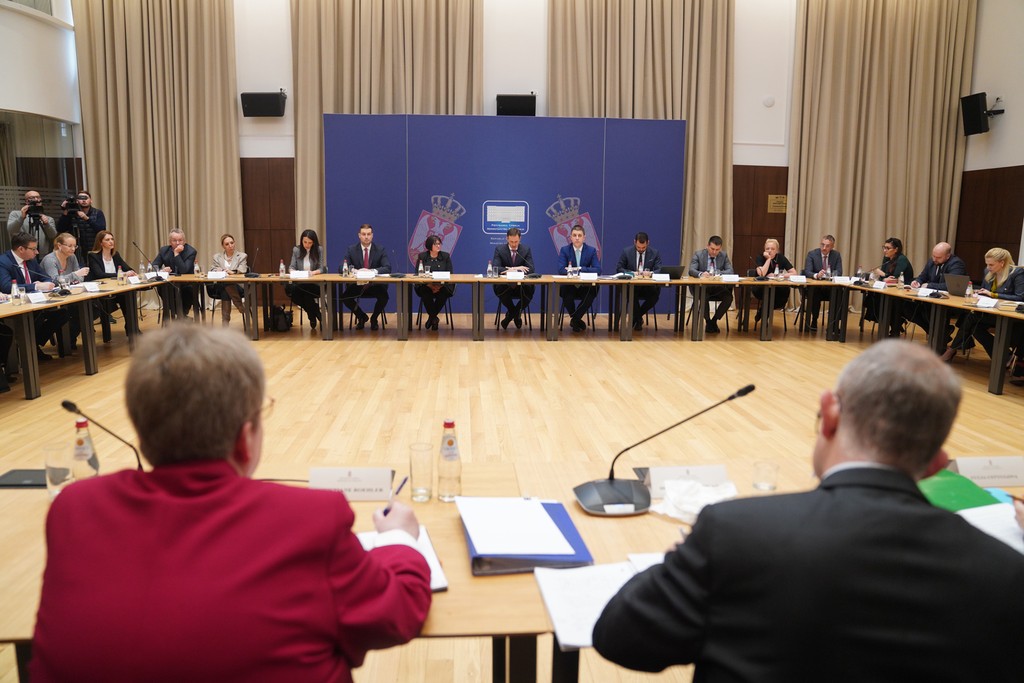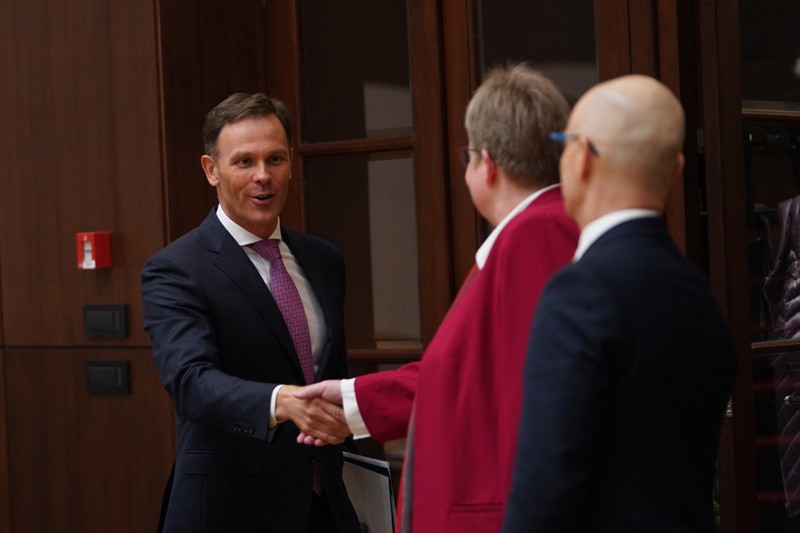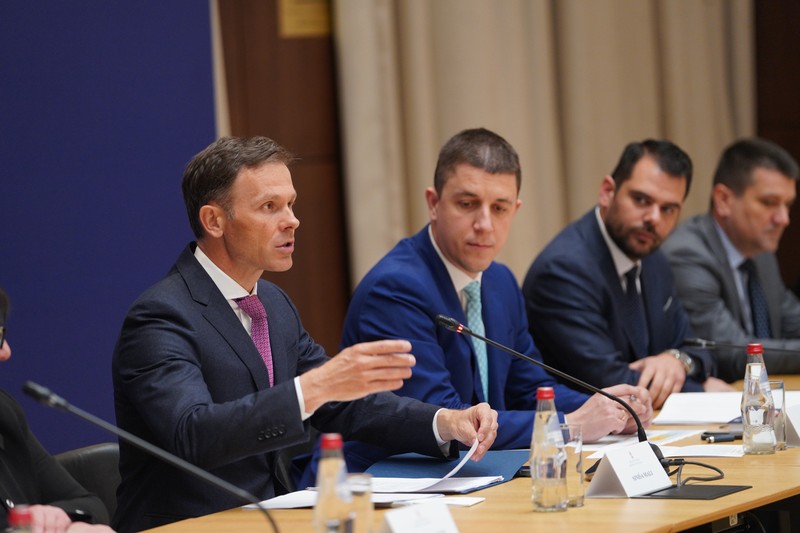The Ministry of Finance announced that a delegation from that Ministry, led by Deputy Prime Minister and Minister of Finance Sinisa Mali, met today with the Mission of the International Monetary Fund (IMF), led by Donal McGettigan, as part of the third consideration of the results of the stand-by arrangement that the Republic of Serbia concluded with that financial institution.
- Serbia
Get to know Serbia
- Citizens
Culture and science
Health services
Pension and disability insurance
- Business
Employment
Economy
- Media
- Government
- Contact
Keep in touch
Keepin touch
Whether you have a question, comment, suggestion or any problem in the purview of the government, send us your message and we will try to respond as soon as possible. If your problem is not in our purview, we will forward your message to the relevant institution.
Serbia manages to preserve macroeconomic stability
Mali pointed out that, despite numerous challenges and the global crisis, the Republic of Serbia managed to preserve macroeconomic stability and ended the previous year with good results.
The Deputy Prime Minister stated that last year, Serbia recorded an economic growth of 2.5%, that the public debt in relation to GDP is under control and below the Maastricht level, that it attracted €4.5 billion of foreign direct investments, at a record level. foreign exchange reserves and with the further trend of decreasing unemployment.
He added that despite the challenges and large capital investments, Serbia managed to reduce the deficit to 2.2%.
Mali specifically referred to the "Leap into the future – Serbia 2027" plan, which he pointed out will stimulate further economic growth, change the country for the better and bring new energy.
The Deputy Prime Minister particularly pointed out that investors have confidence in our country, that their perception of Serbia as a country is at the level of an investment rating, but also that he is aware of the new global challenges that await us.
He said that the development of artificial intelligence and its impact on the labor market, energy and the reform of this sector, along with further capital investments, remain priorities for Serbia.
Donal McGettigan pointed out that he appreciates the open approach that Serbia has shown in the previous period, with quality discussion, and added that he agrees that all the mentioned economic aspects of Serbia in 2024 were good.
He particularly praised the Iskra project, an electronic register of employees in the public sector, through which salaries are currently paid for 300,000 employees.
In this way, a payroll system was introduced for the first time, which means better planning, execution and control of expenditures, as well as greater transparency and better management of human resources.
When it comes to the current arrangement, the goal has been fulfilled, which implies that employees in the education sector will be part of Iskra, and by the end of the year, another 59,000 employees will be added to this system.
When it comes to other goals from the arrangement, an action plan was adopted to make mid-term budget planning more efficient and binding, the legal status of Elektroprivreda Srbije (EPS) was changed to a joint-stock company, the Government adopted an investment plan for the energy sector, with defined priorities and costs and projects that can be implemented during the next 2 to 5 years, and the new Law on Ownership Management in State Enterprises was adopted.
The officials also discussed the new methodology for determining the price of electricity supply for the unregulated sector, as well as the new methodology for determining the price of gas for the unregulated sector, which are being worked on and should come into force within the year.
The Republic of Serbia and the International Monetary Fund entered into a stand-by arrangement lasting 24 months until the end of December 2024.
The current arrangement was approved by the board of directors in Washington on 19 December 2022.
This arrangement represents continuity in relation to the successfully implemented Policy Coordination Programme.
The officials confirmed that the rest of the arrangement will be treated as a precautionary regime, and that there will be no further withdrawals unless there are new global shocks.
The mission of the International Monetary Fund will stay in Belgrade until 26 March, according to the announcement.
-
 Belgrade/Skopje, 3 December 2025
Belgrade/Skopje, 3 December 2025Strengthening economic cooperation, business ties with North Macedonia
-
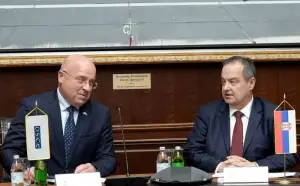 Belgrade, 2 December 2025
Belgrade, 2 December 2025Cooperation with OSCE Mission to improve Serbian police capacity
-
 Belgrade, 29 November 2025
Belgrade, 29 November 2025Dačić bids farewell to President of DR Congo at Belgrade airport
-
 Belgrade, 28 November 2025
Belgrade, 28 November 2025Great opportunities for improving relations with DR Congo
-
 Belgrade/Marrakesh, 26 November 2025
Belgrade/Marrakesh, 26 November 2025Interpol honours Dačić with its Special Class Medal
-
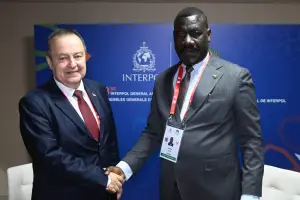 Belgrade/Marrakesh, 26 November 2025
Belgrade/Marrakesh, 26 November 2025Deepening police cooperation between Serbia, Namibia
-
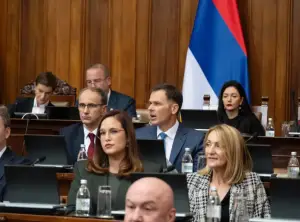 Belgrade, 25 November 2025
Belgrade, 25 November 20252026 budget socially responsible, aimed at further raising living standards
-
 Belgrade/Marrakesh, 25 November 2025
Belgrade/Marrakesh, 25 November 2025Room for strengthening police cooperation with Morocco
-
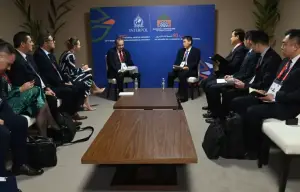 Belgrade/Marrakech, 25 November 2025
Belgrade/Marrakech, 25 November 2025Improving security cooperation with People’s Republic of China within Interpol
-
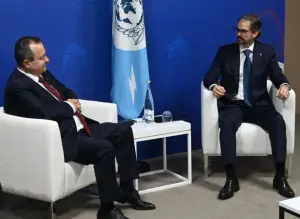 Belgrade/Marrakesh, 24 November 2025
Belgrade/Marrakesh, 24 November 2025Contribution of Serbian police to international fight against crime

